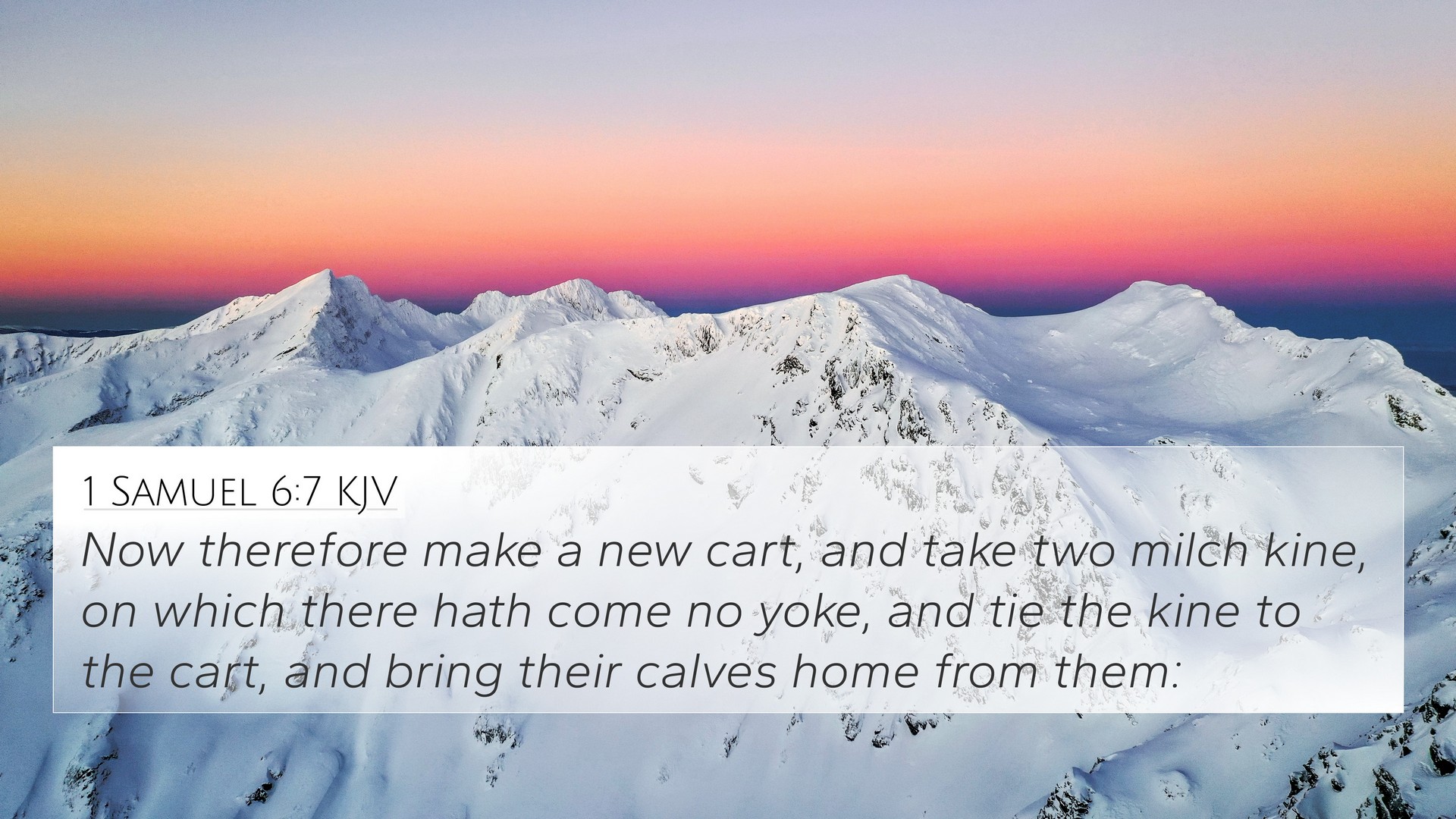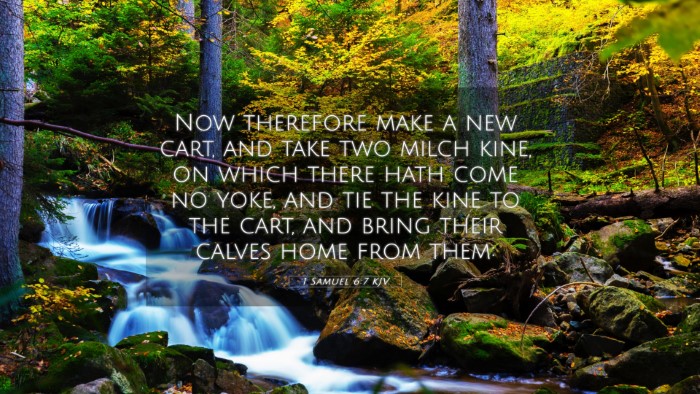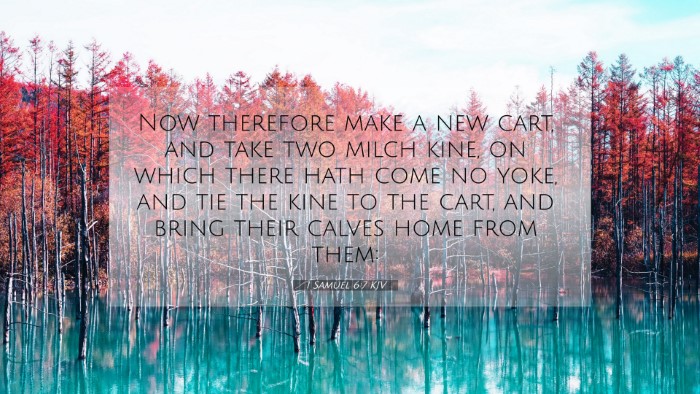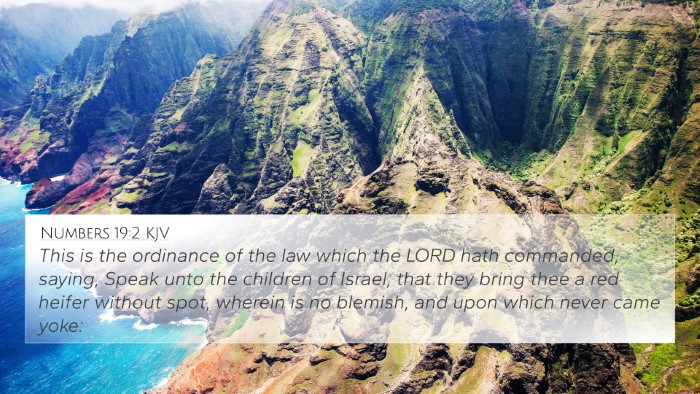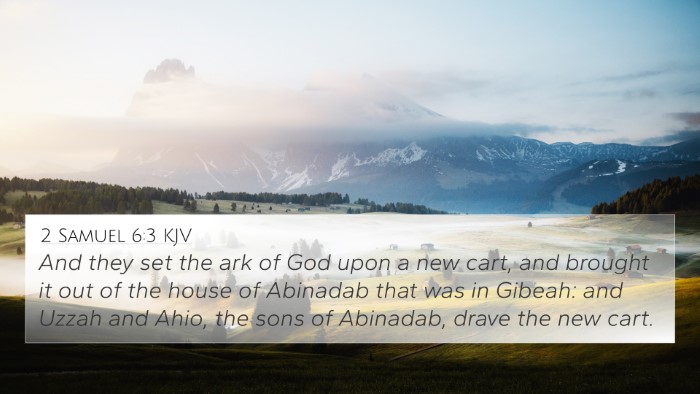Understanding 1 Samuel 6:7
The verse 1 Samuel 6:7 states: "Now therefore make a new cart, and take two milk cows, on which there hath come no yoke, and tie the cows to the cart, and bring their calves home from them." This verse is crucial in understanding the return of the Ark of the Covenant to Israel after it had been captured by the Philistines. The instructions given here reflect a methodical approach to honoring God through the process of returning the Ark.
Commentary Insights
-
Matthew Henry:
Matthew Henry indicates that the instructions concerning the milk cows and the new cart illustrate the necessity of sincerity and purity when approaching God. The choice of untrained cows, which had never been yoked, symbolizes the untainted nature of the offerings we should present to God. Furthermore, their direction towards Bethshemesh, a city of priests, underlines the desire for the Ark to be returned rightly to God's people.
-
Albert Barnes:
Albert Barnes elaborates on the specific instructions of using milk cows as a means of transport, highlighting that these animals would naturally desire their calves. The act of separating them from their young illustrates the miraculous guidance of God as the cows move towards the destination without hesitation, symbolizing obedience. This emphasizes that God’s will prevails even through the natural instincts of the creatures He created.
-
Adam Clarke:
Adam Clarke provides an extensive interpretation of the symbolism found in this verse. He points out that the new cart signifies the novelty of God's providence in guiding Israel back to Him. The absence of yoke on the cows suggests a state of freedom, alluding to the spiritual freedom that is found in obeying God's commands. Clarke further notes that the offerings made to God must come from a pure heart, which demonstrates the importance of reverence and worship in our walk with God.
Bible Cross-References
This verse can be related to several other Bible passages that explore similar themes of obedience, divine guidance, and the sanctity of offerings:
- Exodus 25:10: Discussing God’s instructions for making the Ark.
- 1 Chronicles 13:7-10: Describing David’s attempt to bring back the Ark, showing the consequences of not following God’s guidance.
- Hebrews 9:4: Explaining the significance of the Ark within the context of the New Covenant.
- Deuteronomy 12:5-6: Relaying God’s command to worship Him in the specific way that pleases Him, similar to the reverent act noted in 1 Samuel 6:7.
- Psalms 78:61: Referring to God giving His strength into captivity, echoing the importance of the Ark’s protection over Israel.
- Acts 15:16: Connecting to the theme of God's presence among His people, which the Ark represented.
- 2 Samuel 6:3-7: Highlighting the dangers of neglecting proper reverence for God’s symbols, which is crucial for understanding the significance of 1 Samuel 6:7.
Thematic Connections
The verse emphasizes the themes of:
- Obedience to God: The careful following of instructions given by the priestly order in returning the Ark illustrates discipleship and submission to divine will.
- Divine Sovereignty: The act of natural instinct guiding the cows demonstrates God's sovereign control even over animal behavior, leading to His purposes.
- Holiness in Worship: The specifications provided for the offering reveal the importance of holiness in returning to God, showing how we must approach Him with reverence and purity.
Conclusion
1 Samuel 6:7 serves as a potent reminder of the care and intentionality required in our worship and the ways we present ourselves and our offerings before God. Through a comparative Bible verse analysis, we observe strong links between the practices outlined in the Old Testament and their implications for understanding obedience and divine alignment in the New Testament. By using tools for Bible cross-referencing, such as a Bible concordance or a cross-reference Bible study guide, we can further explore these connections.
Further Study Topics
- How to find cross-references in the Bible.
- Identifying connections between Old and New Testament teachings.
- Cross-referenced themes in the Bible and their impact on modern believers.
- Diving into the significance of the Ark of the Covenant in Biblical history.
